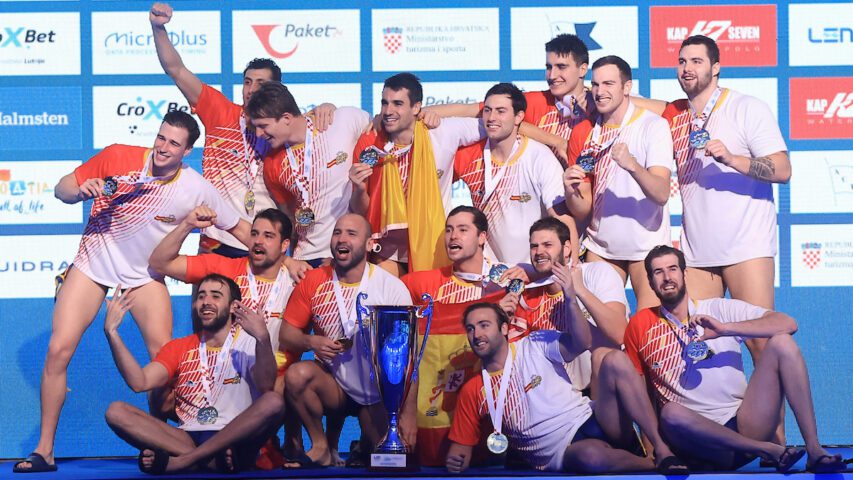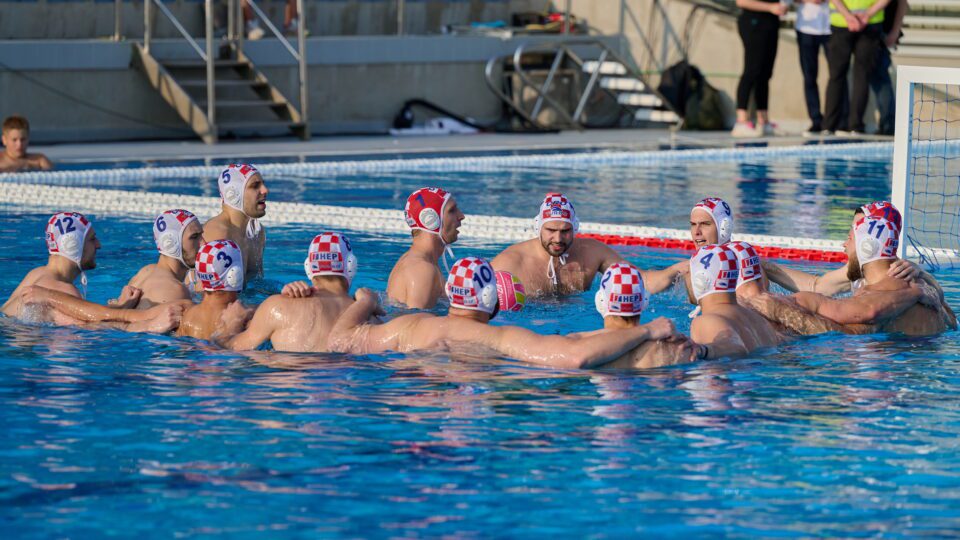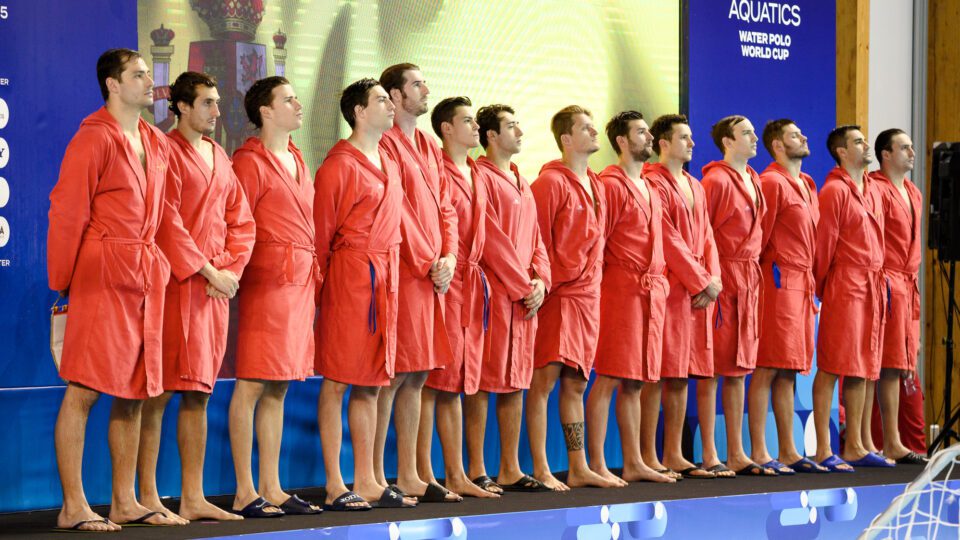Spain won the only title that was missing in its treasury. The Spaniards defeated Croatia 11:10 in the final of the European Championships in Zagreb.
The Spaniards not only dethroned the 2022 champions, the Croats, but also clinched the double honor. By winning gold, they earned an Olympic berth. Croatia will have another opportunity to battle for a spot in the Paris Olympics at the upcoming World Championships in Doha in February.
Spain’s victory came after a remarkable comeback in the final quarter. Despite Croatia maintaining a lead for most of the match, entering the final quarter with a 10:8 advantage, Spain staged an impressive rally. Alvaro Granados emerged as the hero of the game, displaying exceptional quality when it mattered the most. With a minute and a half remaining, he leveled the score at 10:10, and just 48 seconds before the final whistle, he scored the winning goal—a magnificent moment sealing Spain’s European triumph.
After finishing in 4th place at the Tokyo Olympics, Spain has won seven medals at all major competitions in the last two years and a half.
For the first time, Croatia lost in the final of the European Championships in front of the home crowd (it won the gold medals in Zagreb in 2010 and in Split in 2022).
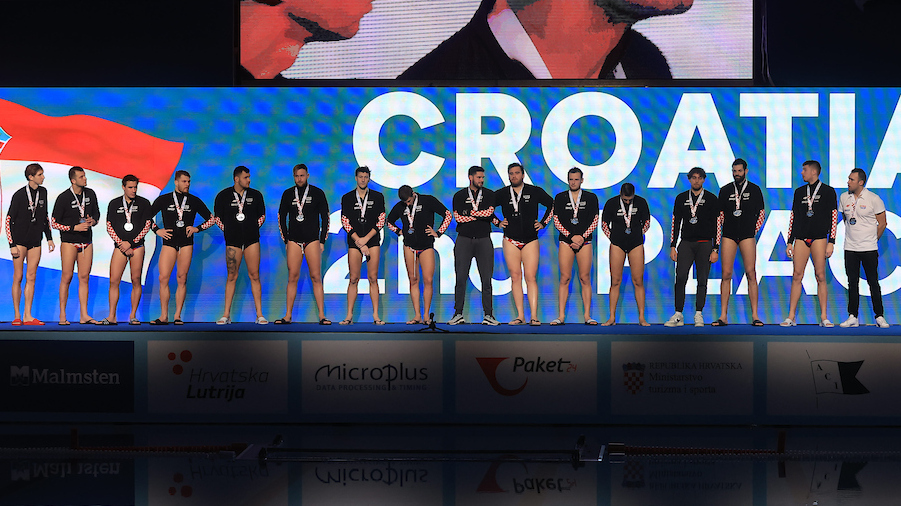
Croatia Photo by Istvan Derencsenyi/European Aquatics
Italy departs with the bronze medal in hand, as the young Hungarian team wasn’t able to upset “Settebello” once more. In the 3rd-place match, Italy beat Hungary 12:7, securing its first European medal in a decade.
A five-goal margin marked the end of the 5th-place match, with Greece emerging victorious over Montenegro (15:10).
Serbia dominated the 7th-place game in a one-sided contest, defeating Romania with a resounding score (18:7).
2024 European Men’s Championships (January 4 – 16), Day 13
Final
Croatia – Spain 10:11 (5:3, 2:3, 3:2, 0:3)
Croatia: Bukic 4, Zuvela 2, Marinic Kragic 2, Vukicevic 1, Fatovic 1
Spain: Granados 3, Sanahuja 3, Munarriz 2, Larumbe 1, Tahull 1, Bustos 1.
The opening minutes indicated that the game would be a high-scoring contest. There were four exclusions and as many goals in the first three minutes. Croatia took a one-goal lead twice (first from a penalty and then from a 6 on 5), but Spain leveled on both occasions with a man-up.
After Croatia failed to convert a man-up (Aguirre saved a shot from Fatovic), Munarriz gave Spain a 3:2 lead. However, Croatia responded with three goals within 01:04 minutes and went to 5:3. Therefore, Spain’s head coach David Martin had to call a time-out already in the sixth minute, but his team didn’t stop Croatia’s series.
The hosts kept the momentum. Luka Bukic gave them a 6:3 lead in their first possession in the second quarter. The Spaniards consolidated their defense and started imposing their rhythm. They responded with two quick goals, both from a distance (Munarriz and Larumbe) and trailed by a goal in the 11th minute. However, Luka Bukic, Ivica Tucak’s “Joker Card” in the first half, made it 7:5. It was Bukic’s fourth goal in the final. He scored three in total in all previous matches.
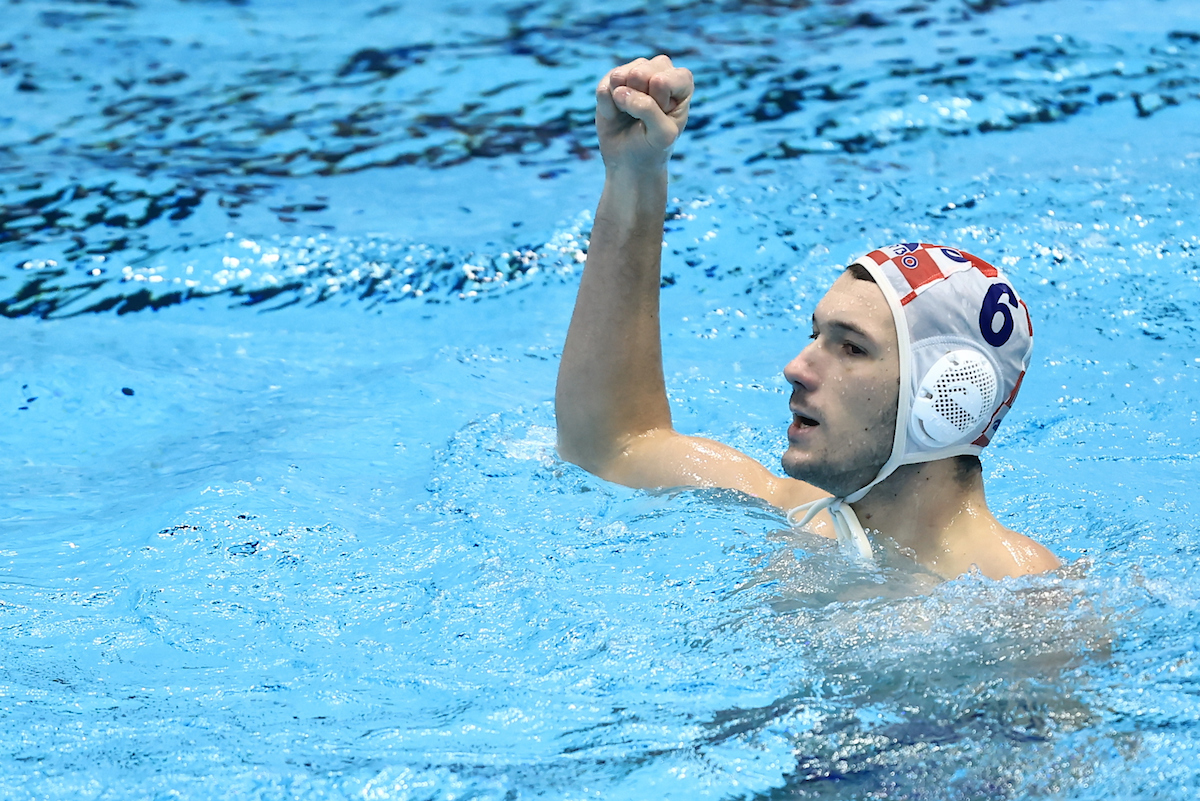
Luka Bukic Photo by Istvan Derencsenyi/European Aquatics
But, only goal separated the rivals at the middle break as Biel converted a man-up in the 15th minute.
Spain leveled at 7:7 in the 18th minute. After a good defense with a man-down, the Spaniards started a counter attack, which was finished by Bernat Sanahuja.
As the game was approaching an end, there were fewer and fewer goals. Both defenses worked well, but there were mistakes in the attack at both ends of the pool. Marinic Kragic made it 8:7 with a man-up, Tahull leveled in the 23rd minute. Still, Croatia earned a 2-goal lead in the final 54 seconds of this period. First, Zuvela scored from a 6 on 5. Just three seconds from the end of the period, Loren Fatovic found the net from a distance in a difficult position for 10:8.
Before the final quarter, Spain’s head coach, David Martin, switched goalkeepers. Eduardo Lorrio replaced Unai Aguirre. That maybe impacted Spain’s defense. Still, it’s true that Croatia focused more on defense than on attack in the fourth quarter. That tactic worked well until the middle of the quarter, when Bernat Sanahuja scored from a 6 on 5, and Spain was just one goal behind (9:10).
Croatia didn’t have good solutions in the attack in the fourth period. It lost the ball several times. At the other end of the pool, Marko Bijac posted one save after another. Still, he couldn’t block a long-distance shot from Alvaro Granados, who had a poor percentage of shots until that moment (1/7).
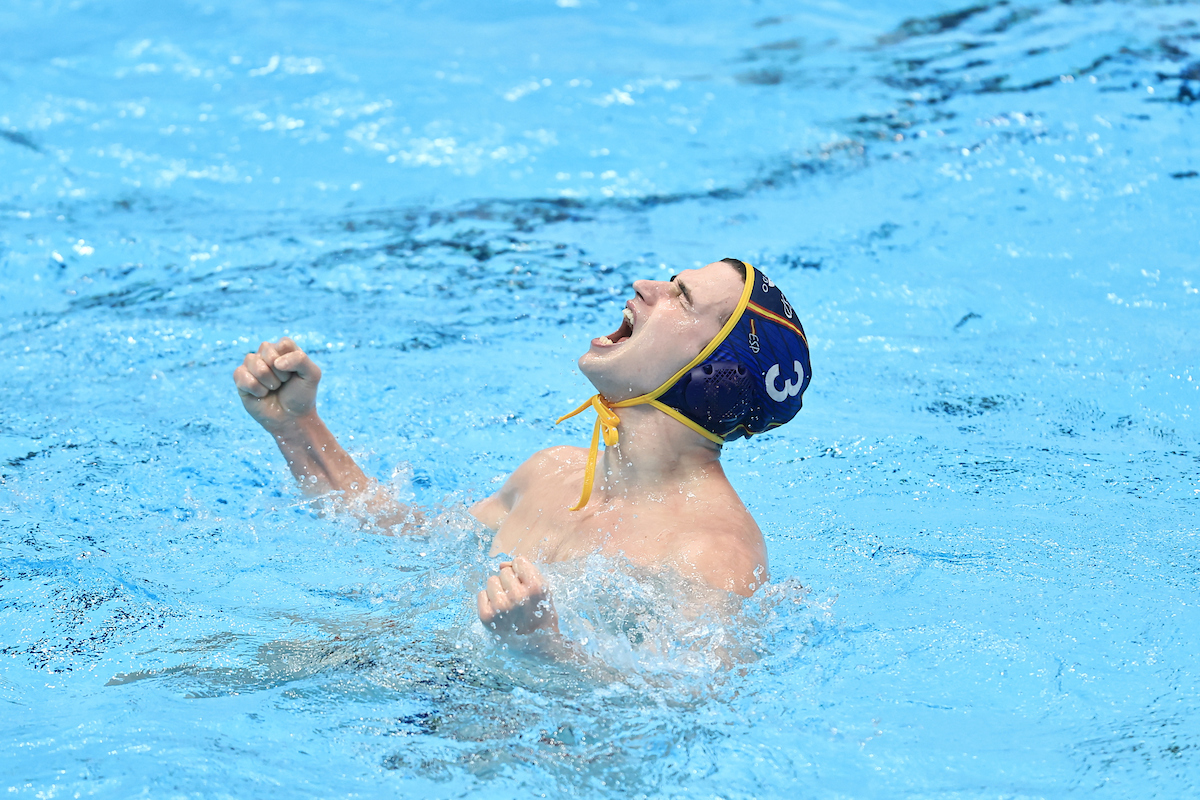
Alvaro Granados after scoring a winner Photo by Istvan Derencsenyi/European Aquatics
Croatia lost the ball in its following possession. Spain had a chance to organize a counterattack, but they slowed. Still, they knew what they were doing. Bernat Sanahuja noticed that Alvaro Granados escaped Croatia’s defense and passed the ball to him. Granados netted a great backhander and Spain went in front for the second time in the game – 11:10 with 48 seconds remaining.
Croatia earned a man-up with 23 seconds left on the clock, but Bustos blocked a shot from Fatovic, Spain grabbed the ball and the big win.
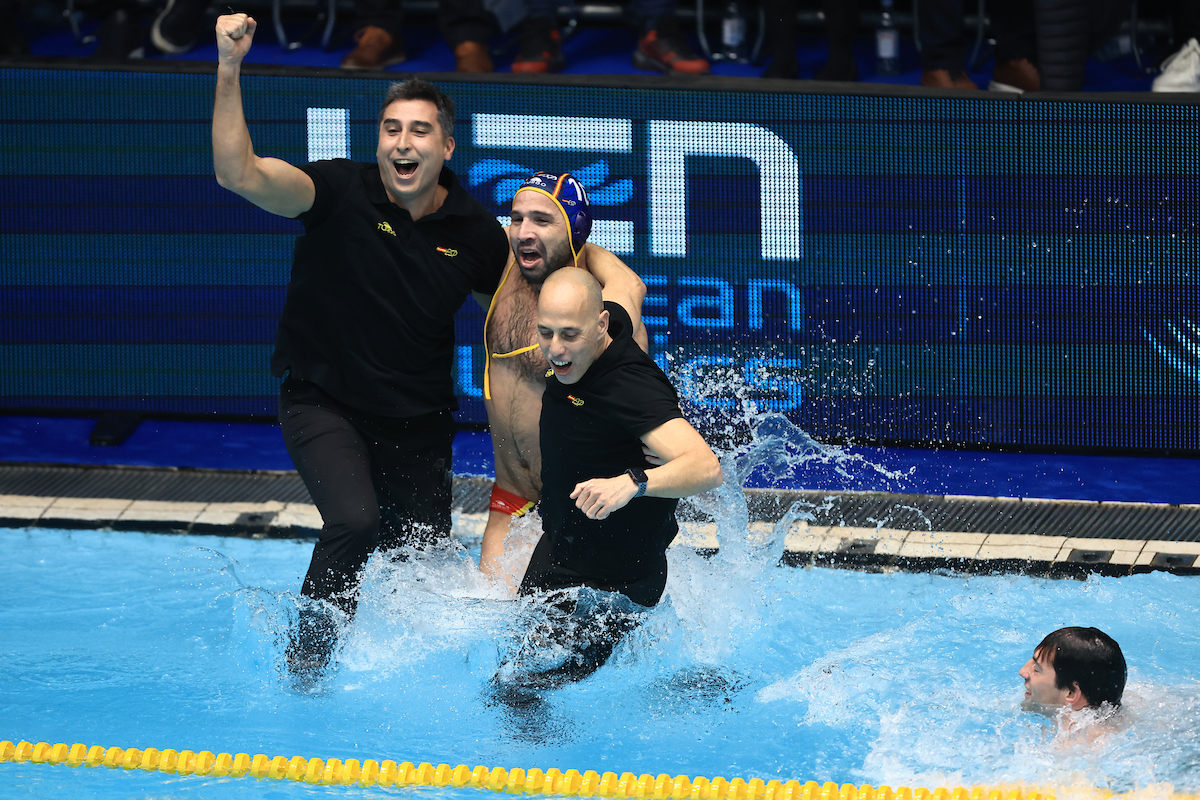
Photo by Istvan Derencsenyi/European Aquatics
Bronze-medal match
Hungary – Italy 7:12 (1:4, 2:4, 1:2, 3:2)
Hungary: Vin. Vigvari 3, Tatrai 2, Nagy 1, Burian 1.
Italy: Fondelli 3, Echenique 3, Cannella 2, Renzuto Iodice 1, Presciutti 1, Di Somma 1, Velotto 1.
Eight days ago, Hungary upset Italy with a 10:5 win in Group B. The “Settebello” showed their real strength today. Hungary’s young team appeared exhausted after two intense games in the past four days (against Serbia and Hungary), which may have affected their performance.
Italy was without two key players in the first match against Hungary – Edoardo Di Somma (suspended) and Francesco Di Fulvio (head coach Campagna’s decision). Today, they were on the roster. Although the two didn’t make a significant contribution in terms of goals, they did help their teammates by drawing personal fouls, assisting, and stealing balls.
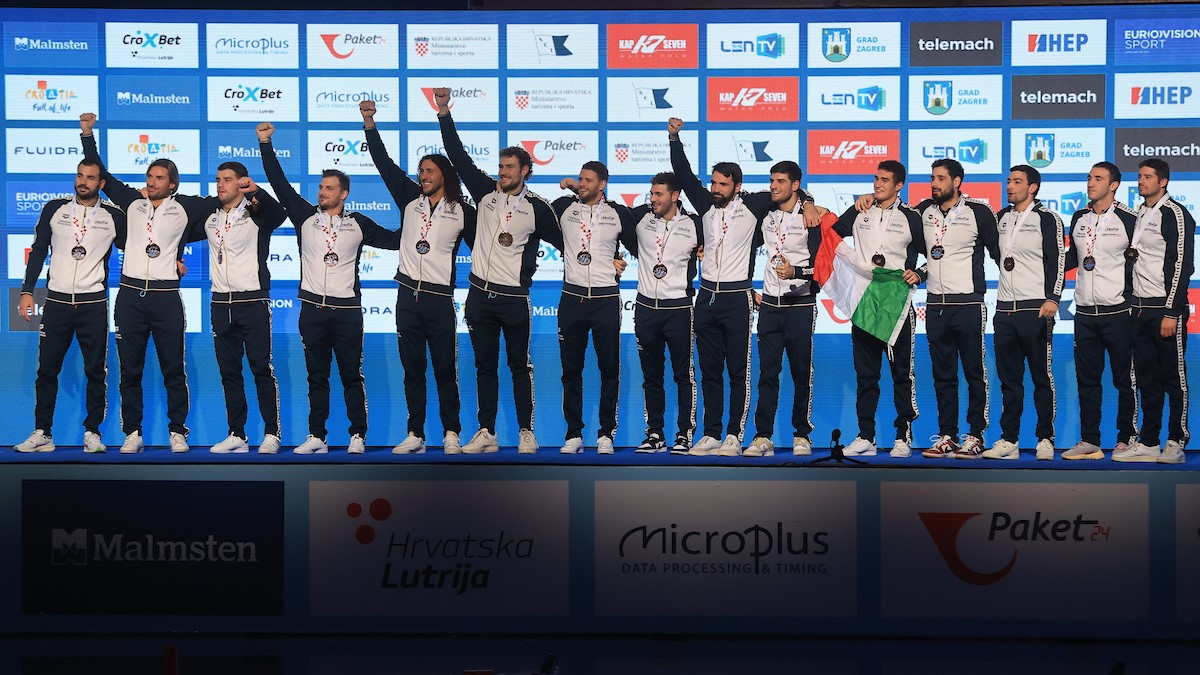
Italy, bronze Photo by Istvan Derencsenyi/European Aquatics
Italy’s attack was led by Gonzalo Echenique, who scored the first goal in the game after 26 seconds of play, and Andrea Fondelli, who converted a man-up to make it 2:0 less than a minute later. Vince Vigvari put Hungary on the scoreboard in the 6th minute, but Italy replied with a 4:0 run and had a 6:1 lead in the 10th minute. The Italians scored more goals in the first ten minutes of the bronze-medal match than in the first duel against Hungary in Zagreb.
Hungary reduced the gap with goals from Tatrai and Vince Vigvari – 3:6. Between these two, they killed Italy’s double man-up. However, Italy went to 8:3 by the middle break and continued dictating the pace in the second half. The Italians didn’t perform well in the attack as in the first 16 minutes, but the defense, with excellent Marco Del Lungo (10 saves), was up to the task. Giacomo Cannella, who returned to the team after missing the previous two games in the knockout round, scored for 12:4 in the 26th minute and the contest practically ended.
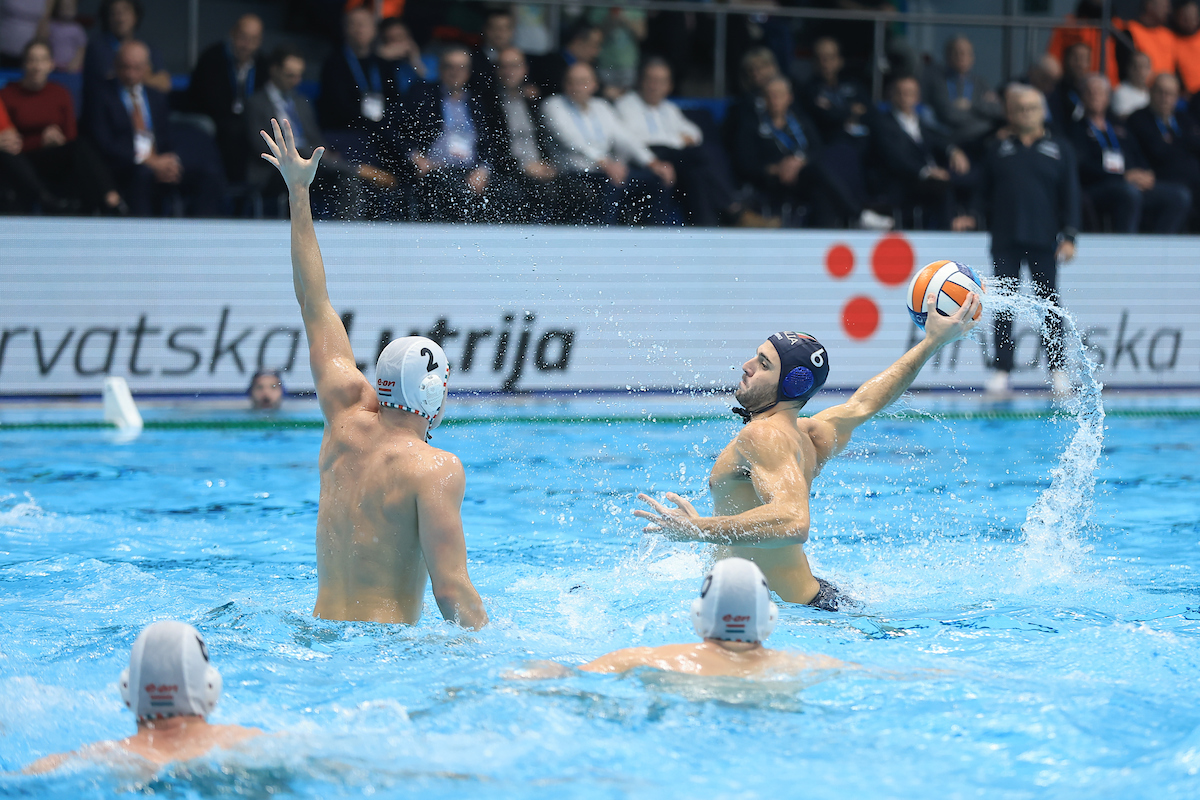
Giacomo Cannella Photo by Istvan Derencsenyi/European Aquatics
Italy won its first medal at the European Championships and bronze in Budapest in 2014. As for the Hungarians, there is no cause for big disappointment. Numerous young players demonstrated their capabilities, affirming that head coach Zsolt Varga can confidently rely on them in the times ahead.
5th-place match
Greece – Montenegro 15:10 (6:2, 2:3, 1:2, 6:3)
Greece: Genidounias 4, Gkillas 3, Kalogeropoulos 2, Argyropoulos 2, Nikolaidis 2, Skoumpakis 1, Kakaris 1.
Montenegro:Averka 2, Mrsic 2, Ukropina 2,Brguljan 1, Perkovic 1, Dj. Radovic 1, V.Radovic 1
Greece’s strong start set the tone of the match. The Greeks quickly earned a 3:0 lead, later extending it to a commanding 5:1 advantage. Over the next 15 minutes, both teams exchanged goals, with Greece maintaining a consistent 4-goal and 3-goal lead. In the latter part of the third quarter, Averka capitalized on a man-up opportunity and Montenegro narrowed the deficit to two goals (7:9). The beginning of the fourth quarter saw Montenegro drawing even closer, with Miroslav Perkovic scoring from a 6 on 5, bringing the margin to just one goal (8:9).
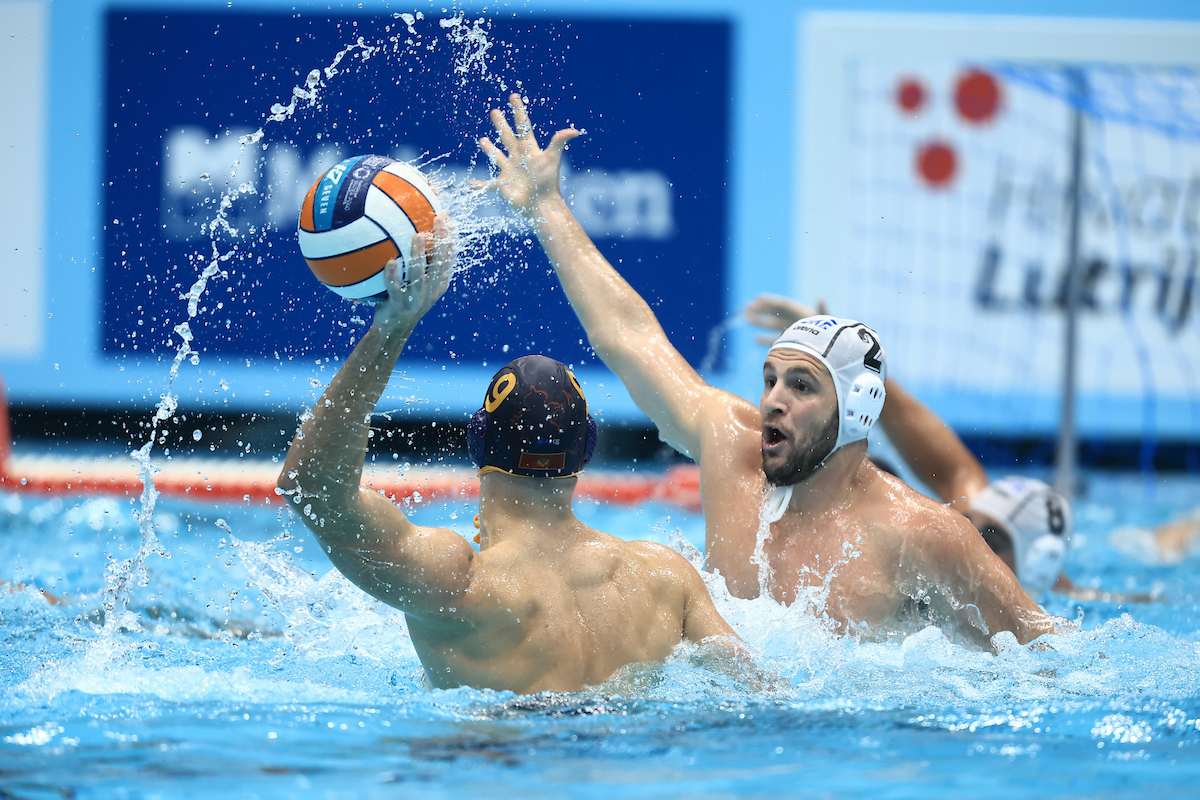
Konstantinos Genidounias (GRE) attempts to block Aleksa Ukropina (MNE) Photo by Istvan Derencsenyi/European Aquatics
Greece successfully stopped Montenegro’s comeback, netting two quick goals in 43 seconds through Argyropoulos and Gkillas, extending their lead to 11:8. Vasilije Radovic provided a glimmer of hope for Montenegro at 9:11. However, Greece ultimately secured a comfortable 13:9 lead, sealing the victory with two rapid goals in the middle of the final period courtesy of Nikolaidis and Skoumpakis.
7th-place match
Serbia – Romania 18:7 (5:1, 3:2, 4:1, 6:3)
Serbia: Mandic 4, Lazic 4, S. Rasovic 3, Radulovic 2, Drasovic 2, N.Jaksic 1, Vico 1 Lukic 1.
Romania: Vranceanu 2, Lutescu 1, Tepelus 1, Neamtu 1, Colodrovschi 1, Vancsik 1.
Serbia did a clean job in the 7th-place match, just like in the 9th-place game against Romania in Split in 2022 (17:1).
Both teams achieved better results than at the 35th European Championships. Still, the Romanians are more satisfied with their results than the Serbs, despite the result of the last match. They are among the best eight teams in Europe for the first time after ten years and qualified for the World Championships.
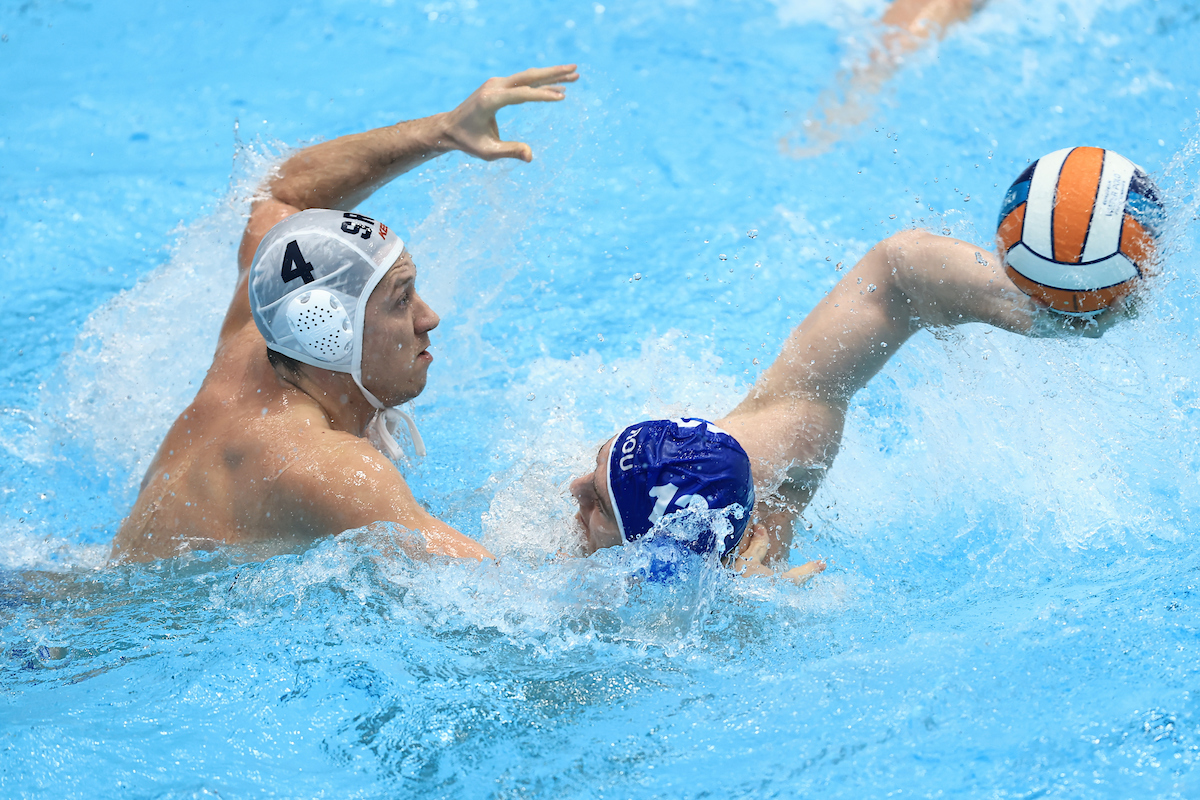
Randjelovic (SRB) stops Vancsik (ROU) Photo by Istvan Derencsenyi/European Aquatics
Serbia had higher ambitions. After failing to reach the semifinals, the Serbs had enough motivation to bounce back after two defeats and to finish the tournament with a win. They dominated today’s game from the beginning. They rushed to a 4:0 lead. Midway through the second period, Serbia was six steps ahead (7:1). Eight goals separated the rivals before the final period (12:4). The Romanians’ fans believed their team could avoid a double-digit defeat since their players trailed 7:15 with three minutes left on the clock. However,the Serbs scored the last three goals in the game for an 11-goal win.
Serbia had a very good percentage of extra player shots (9/12) and committed only four personal fouls. Romania scored two goals with a man-up.
Final standings
1.Spain
2.Croatia
3. Italy
4. Hungary, 5. Greece, 6. Montenegro, 7. Serbia, 8. Romania, 9. France, 10. Georgia, 11. Netherlands, 12. Germany, 13. Slovakia, 14. Slovenia, 15. Malta, 16. Israel.
All medal winners, Men
1926, Budapest: Hungary, Sweden, Germany
1927, Bologna: Hungary, France, Belgium
1931, Paris: Hungary, Germany, Austria
1934, Magdeburg: Hungary, Germany, Belgium
1938, London: Hungary, Germany, Netherlands
1947, Monte Carlo: Italy, Sweden, Belgium
1950, Vienna: Netherlands, Sweden, Yugoslavia
1954, Torino: Hungary, Yugoslavia, Italy
1958, Budapest: Hungary, Yugoslavia, USSR
1962, Leipzig: Hungary, Yugoslavia and USSR (shared 2nd place)
1966, Utrecht: USSR, West Germany, Yugoslavia
1970, Barcelona: USSR, Hungary, Yugoslavia
1974, Vienna: Hungary, USSR, Yugoslavia
1977, Jonkoping: Hungary, Yugoslavia, Italy
1981, Split: West Germany, USSR, Hungary
1983, Roma: USSR, Hungary, Spain
1985, Sofia: USSR, Yugoslavia, West Germany
1987, Strasbourg: USSR, Yugoslavia, Italy
1989, Bonn: West Germany, Yugoslavia, Italy
1991, Athens: Yugoslavia, Spain, USSR
1993, Sheffield: Italy, Hungary, Spain
1995, Vienna: Italy, Hungary, Germany
1997, Sevilla: Hungary, Yugoslavia, Russia
1999, Florence: Hungary, Croatia, Italy
2001, Budapest: Yugoslavia, Italy, Hungary
2003, Kranj: Serbia & Montenegro, Croatia, Hungary
2006, Belgrade: Serbia, Hungary, Spain
2008, Malaga: Montenegro, Serbia, Hungary
2010, Zagreb: Croatia, Italy, Serbia
2012, Eindhoven: Serbia, Montenegro, Hungary
2014, Budapest: Serbia, Hungary, Italy
2016, Belgrade: Serbia, Montenegro, Hungary
2018, Barcelona: Serbia, Spain, Croatia
2020, Budapest: Hungary, Spain, Montenegro
2022, Split: Croatia, Hungary, Spain
2023, Zagreb/Dubrovnik: Spain, Croatia, Italy
Medal table: 1. Hungary 26 (13 gold, 7 silver, 6 bronze medals), 2. USSR 10 (5, 3, 2), 3. Serbia 7 (5, 1, 1), 4. Italy 12 (3, 2, 7), 5. Croatia 6 (2,3,1), 6. FR Yugoslavia/Serbia and Montenegro 3 (2, 1, 0), 7. West Germany 3 (2, 0, 1), 8. SFR Yugoslavia 12 (1, 7, 4), 9. Spain 8 (1, 3, 4), 10. Montenegro 4 (1, 2, 1), 11. Netherlands 2 (1, 0, 1), 12. Germany 5 (0, 3, 2), 13. Sweden 3 (0, 3, 0), 14 – 15. East Germany 1 (0, 1, 0) and France 1 (0, 1, 0), 16. Belgium 3 (0, 0, 3), 17 – 18. Austria 1 (0, 0, 1) and Russia 1 (0, 0, 1).
Note: The first criterion for the rankings is the number of titles, and the second is the number of silver medals.
European Championships schedule and scores
More articles about the European Championships



